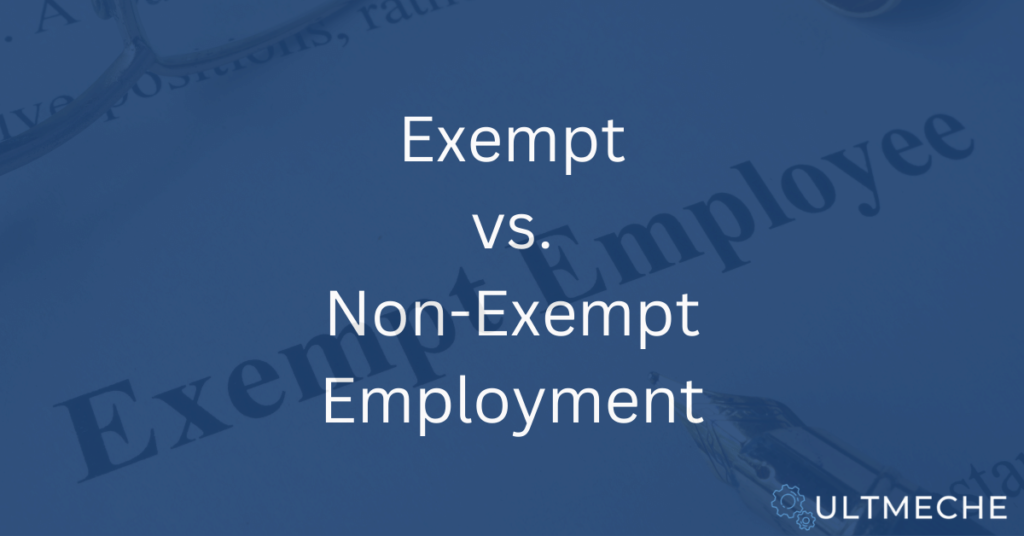Understand what exempt vs nonexempt means in employment.
Embarking on a new job search or employment journey involves navigating sometimes complex classifications. The concept of exempt” vs nonexempt is an example of how important classifications can significantly sway your employment decisions.
Crucial labour laws define role descriptions that can have significant implications for both employers and employees, shaping job responsibilities, work hours, and pay.
Let’s explore the vital distinctions between exempt and non-exempt employee classifications, and look at the impact these differences can have on individuals and hiring businesses.

What Is The Difference Between an Exempt and Nonexempt Employee?
There are a few important differences between exempt and non-exempt employees covered by the Fair Labor Standards Act (FLSA).
Exempt employees are most often salaried and are exempt from overtime pay regulations outlined in the FLSA. Exempt positions provide a fixed salary, regardless of the number of hours worked, reflecting a more autonomous and senior level of employment.
However, hourly payment characterises non-exempt employees, and they are entitled to overtime pay for any hours worked beyond the outlined workweek (usually 40 hours). Non-exempt status aims to guarantee fair compensation for additional hours worked and is commonly linked to entry-level or hourly positions.
There are some job roles that are exempt or non-exempt by definition but in most cases an employee must fit three requirements to be classified as “exempt”.
- The annual payment should be at least $23,600 ($455 per week).
- The payment must be on a salary basis.
- Perform “exempt” job duties.
These requirements are outlined in the FLSA Regulations.
The Pros and Cons of Exempt vs Nonexempt Employment
There are advantages and challenges associated with both classifications.
Pros and Cons of Exempt Employment
Pros:
- The work schedule offers a level of flexibility, maintaining a consistent salary regardless of the actual number of hours worked. This, of course, also can have its drawbacks.
- Exempt positions are more often higher-paying to account for the lack of earnings through overtime.
- People view exempt roles as more permanent positions, involving decision-making or holding seniority. This allows employees to make influential and easily evidenced changes that provide opportunities to improve a resume long-term.
Cons:
- A fixed salary can mean extended working hours without additional compensation on top of salaried pay.
- There can be a more blurred line between work and personal time in senior roles. This can make striking a good work-life balance more challenging.
- Employees in exempt roles can find that they are working towards role-related goals rather than time related goals and this can require more work and longer hours.
Pros and Cons of Non-Exempt Employment
Pros:
- Non-exempt employees are eligible for overtime pay. This is typically at a rate of time and a half for hours worked beyond the standard work week. This can significantly increase earnings during busy periods.
- Overtime pay means that employees receive fair compensation for their time.
- Non-exempt employees find it easier to distinguish between work and personal time because overtime is clearly labelled.
Cons:
- Non-exempt employees may have less flexibility in managing their work hours. Overtime needs to be approved, and exceeding standard working hours may not be encouraged.
- Overtime can lead to burnout where the extra pay for more hours is tempting.
- Whilst there is an opportunity to earn more through overtime, standard pay is inconsistent and there might not always be opportunities to work more hours.
- Limited professional autonomy may exist in non-exempt roles due to close monitoring of hours.
Frequent Questions About Exempt vs. Non-Exempt Employment
Can You Ask Exempt Employees to Work Certain Hours?
The nature of an exempt employment role can mean that employers have more flexibility in the hours that can be asked of employees. They may be required to work beyond standard business hours or outside a traditional 9-to-5 schedule, depending on job requirements.
In these roles, goals and OKRs are often project based and this can mean hours fluctuate.
Employers should be mindful of work-life balance. They should not exploit the exemption status by imposing excessive hours or goals that are unrealistic in usual working hours.
Employment contracts, company policies, and applicable labour laws play a crucial role in determining the extent to which employers can mandate work hours for exempt employees. Additionally, industries and roles may have specific regulations that influence or limit working hours.
Which Classification Is Right For You?
Salary requirements and the desire for flexibility can influence which is the right classification for you. Both exempt and non-exempt classifications have considerable pros and cons that need to be considered.
For roles that require a high degree of autonomy, where the job duties are predominantly managerial, executive, or involve specialised professional tasks, an exempt classification is the most common. Exempt employees often have more flexibility in their schedules and are typically salaried, reflecting a more outcome-oriented approach to pay.
On the other hand, non-exempt roles, typically hourly roles that are subject to overtime pay, are well-suited for positions with clearly defined work hours and responsibilities. Jobs that involve routine tasks and may not require the same level of autonomy as exempt roles often fall under this category.
Optimising Your Resume For A New Job Role
Building an optimised and role specific resume is a strategic and underused trick for job hunting that significantly enhances your chances of standing out in a competitive job market.
Whether you choose to use bullet points to highlight skills or prefer the XYZ format preferred by tech companies, the style you choose can influence how clear and appealing your resume is for a specific role.
Before diving into the resume optimization process, thoroughly research the job role and the company you’re applying to. Understand the skills and qualifications they prioritise, highlight any keywords, and be sure you understand the company culture. This is also the ideal time to identify whether an exempt or non-exempt role is best for you.
Need more help to perfect your resume? Try a resume review or get coaching for your interview.
About the author

Kazuyoshi Fujimoto, PE
Founder | Engineering Career Coach | Principal Mechanical Engineer
Kazu oversees all of ultmeche’s engineering services. He provides consulting such as resume reviews, rewrites, mock interviews, and all services career related. Additionally, Kazu performs consulting work regarding Oil & Gas, Automotive, and Aerospace & Defense. Kazu is licensed as a professional engineer in the state of California and has 9+ years of experience in Oil & Gas, Automotive, and Aerospace & Defense.

2 thoughts on “Exempt vs Nonexempt Employment: Understanding Classifications”